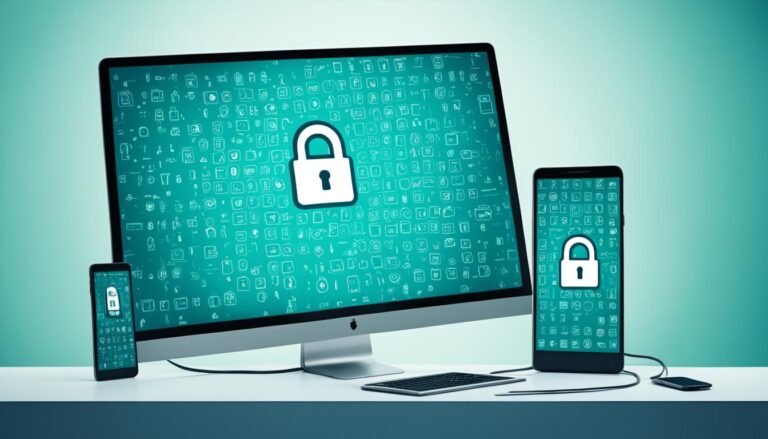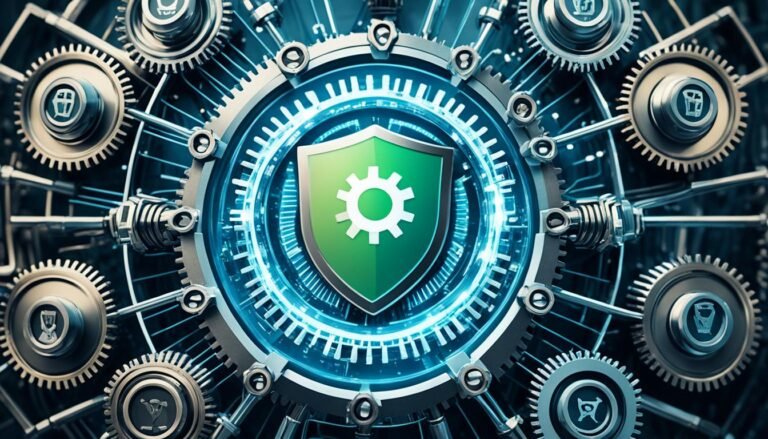Cybersecurity for Remote Workers: Best Practices for Irish Employees
In Ireland, 1/5 of workers now do their jobs remotely. This big change makes remote workforce security very important. Companies of all sizes need good cybersecurity strategies since 2020. Remote and hybrid work bring challenges like phishing. We need to avoid risky free Wi-Fi and use Virtual Private Networks (VPNs) for safety.
Safeguarding digital assets is not just about secure networks. We must watch how we share files and use strong email encryption. These efforts help Ireland’s Remote Working Strategy grow the economy and help rural areas. With new cyber threats, we need better protection.
Research from Zoom and FRS shows that remote work can lower stress and make people happier. But we need to overcome IT issues like different time zones and faulty hardware. Setting up strong Wi-Fi, safe passwords, and banning risky software is key for the future of remote work.
Key Takeaways
- 1/5 of Ireland’s workforce is engaged in remote work.
- Free Wi-Fi is unsafe; VPNs are essential for remote workforce security.
- Remote workers must be vigilant about phishing and social engineering attacks.
- Encryption over email attachments is crucial for safeguarding digital assets.
- Studies show remote workers have lower stress and higher job satisfaction.
- IT service challenges for remote workers include time zone differences and hardware issues.
- Clear agreements on Wi-Fi stability and password protocols are essential for secure remote work.
The Importance of Cybersecurity for Remote Workers in Ireland
With remote work becoming more common, cybersecurity is key. In Ireland, 46% experienced cyber incidents in the last three years. This shows a big need for strong digital protection.
The threat of cyber attacks makes cybersecurity very important. A huge 74% of Irish firms keep their cybersecurity budgets the same. But, only 14% of attacks are reported. This shows a gap in defense that needs filling.
Working from home makes companies more vulnerable. So, strong measures are needed. About 57% offer cybersecurity training. Also, 44% do risk assessments, and 38% use many defenses. They are actively fighting off cyber threats.
Ireland’s ability to protect its digital sector relies on skilled cybersecurity workers. The demand for them has gone up by 29.31% in June 2023. This highlights the important role these experts play in keeping remote work safe.
Here are some important stats about the current situation:
| Statistic | Percentage |
|---|---|
| Cyber Incidents Faced | 46% |
| Data Breaches Experienced | 30% |
| Reported Cyber Incidents | 14% |
| Organizations Not Reducing Cybersecurity Spend | 74% |
| Organizations Conducting Regular Training | 57% |
| Organizations Performing Risk Assessments | 44% |
| Organizations with Multi-layered Defense | 38% |
| Executives Using AI for Cybersecurity | 14% |
| Executives Uncertain About AI Technologies | 30% |
| SMEs Ill-equipped for Cyber Attack Recovery | 83% |
Focusing on cybersecurity is essential because threats keep changing. Irish organizations must put security first. By doing this and joining the growing cybersecurity job market, they can make remote work safer.
Essential Cybersecurity Measures for Remote Employees
Today, 25% of Ireland’s workers are remote, a number that’s growing quickly. For companies, boosting cybersecurity is vital. They should provide training to employees and use secure cloud storage. Following data protection laws helps companies stay safe from data leaks.
Implementing Cybersecurity Training
Training your team about cybersecurity is key. It teaches them to spot online dangers. People learn how to use 2FA and encryption to protect data when devices are lost or stolen. The IEEE’s “Cyber Security Tools for Today’s Environment” can help improve employees’ skills.
Secure Communication Tools
Remote teams need secure ways to share info. Tools like VPNs help by making a safe link to the company’s network, especially on public Wi-Fi. Using encrypted file-sharing services adds more protection. These services control who can see files, reducing the risk of leaks. Don’t forget to back up data using secure cloud storage for safety.
Data Protection Regulations in Ireland
In Ireland, it’s crucial for businesses to follow data protection laws. They need to manage devices and store data safely. Doing regular audits and checks helps to find and fix any security gaps. It makes your online work environment safer. Also, using services that provide the latest about cyber threats is smart. This proactive approach can protect against new dangers.
For a secure remote work setting, focus on cybersecurity training, secure storage, and following data protection rules. This will help your team work safely and with high efficiency.
Home Office Setup Tips: Creating a Secure Remote Workspace
To keep sensitive data safe and stay productive, it’s key to design a safe remote workspace. A good work area at home reduces the chances of cyber risks. It also makes working from home a better experience overall.
Physical Security Measures
It’s important to keep your devices and data safe physically. Make sure they lock automatically when you’re not using them. Also, use different networks for work and personal use. This way, you won’t expose work data to risks.
Update your antivirus software and network security often. This keeps your devices ready to fight off cyber threats. It also protects your data from being compromised.
Utilizing VPNs
Virtual private networks (VPNs) are great for making your remote workspace secure. They let you connect to your work’s network safely from anywhere. This is really important when working on public Wi-Fi.
Taking the recent Facebook and Alibaba breaches as examples, it’s clear why secure connections are so important. Using VPNs at home keeps your work safe from these big cyber threats.
| Company | Data Breach Impact |
|---|---|
| 530 million users | |
| Alibaba | 1.1 billion users |
| 700 million profiles | |
| Accenture | Customer & Corporate Data |
Phishing Awareness Training for Irish Employees
Irish employees need phishing awareness training more than ever. Data shows 36% of data breaches involve phishing. Human error causes over 90% of these cases. So, training is key to protect against these threats.
Spotting phishing emails is vital. Employees must learn to see through suspicious links and signs of malware. More than 90% of ransomware comes from phishing. That’s why our training focuses on these critical skills:
- IT Security is Everybody’s Business
- Cyber-security Awareness Training
- Anti-Phishing / Spear-Phishing Training
- Simulated Phishing Training
- Ransomware Prevention Training
Our courses are not only informative but also easy to use. Employees can complete them in just 45 minutes on any device. Making sure they take these courses yearly is part of solid cybersecurity.
Training also helps meet compliance standards like GDPR and ISO27001. These require regular security training. By teaching how to avoid risky sites and handle data safely, we reduce risks and protect reputations.
Our programs also focus on teaching employees about reporting. Courses include detailed reports and track who’s participated. This lets companies check employees’ knowledge and stay alert against cyber-threats. High customer satisfaction is shown by a Net Promoter Score of 80+, proving the quality of our training.
Here’s a summary of the benefits our training brings:
| Training Modules | Benefits |
|---|---|
| IT Security is Everybody’s Business | Promotes universal responsibility for IT security across the organization. |
| Anti-Phishing / Spear-Phishing Training | Equips employees with tools to identify and mitigate phishing threats. |
| Simulated Phishing Training | Tests employees’ reactions to phishing attempts in a secure setting. |
| Cyber-security Awareness Training | Keeps staff updated on current cyber threats and ways to prevent them. |
Securing Mobile Devices for Remote Work
Remote work is growing, especially in Ireland. Keeping mobile devices safe is key. Workers need to use strong passwords, multi-factor authentication, and update software often. These steps help keep devices secure and protect important information.
Password Management
Using good passwords is crucial for mobile security. Everyone needs to make unique passwords for all accounts and turn on multi-factor authentication. Microsoft says MFA stops almost all attacks. Also, changing passwords often reduces the chance of them being stolen, which causes most data breaches.
Regular Software Updates
Updating software regularly is important. These updates fix holes cybercriminals might use. It’s essential for employees to have the newest operating systems and apps. Groups like Sytorus have seen more people wanting to avoid data breaches and hacks with updated software.
Businesses are working on stronger cybersecurity. TitanHQ notes a big interest in advanced safety measures like SpamTitan and AI-based security by companies like Edgescan and Cyber Risk Aware. They stress the use of VPNs and encrypted devices for safe remote work.
Companies should have strict rules for using devices that aren’t secure. These rules could ban using public computers. They also often suggest using devices that the IT department looks after to boost security.
Especially now, it’s crucial to keep up with cybersecurity. CWSI warns about the need to protect information as how we work changes. Managed IT services, like those from FutureRange, ensure that employees have the latest protection against viruses and malware.
| Challenge | Solution |
|---|---|
| Credential Theft | Implement Multi-Factor Authentication (MFA) |
| Software Vulnerabilities | Ensure Regular Software Updates |
| Unsecured Devices | Adopt Robust Device Management Policies |
| Phishing Dangers | Utilize DNS Filtering |
Implementing an Incident Response Plan
Creating a strong incident response plan is key to fighting off cyber threats. It’s vital for firms to act quickly when facing attacks. This ensures their important data stays safe. Such a plan should include steps to take right away and how to let others know what’s happening. This encourages everyone to report threats and keeps the team learning.

Immediate Action Steps
The NIST scheme for dealing with incidents has five stages. It starts with prep and ends with learning from what happened. To prepare, organizations should know what IT stuff they have and set up ways to watch over it. They should also have ready-to-go plans for handling common threats. The first steps to respond include:
- Identification: Start by looking at the data to find out what’s wrong.
- Containment: Try to stop the threat from spreading further.
- Eradication: Clean out anything harmful from the affected systems.
- Recovery: Get everything back to normal as soon as possible.
Experts say a simple, clear plan is best. It should be tested through drills and kept up to date. Using tools to respond can also improve the plan’s impact.
Reporting Protocols
Having a plan for how to report incidents is critical. It makes sure everyone knows what to do when something goes wrong. The best tips suggest that firms should have clear ways to report issues and tell their team what to do.
Encouraging a reporting culture helps catch problems early. It also allows teams to work on preventing attacks. It’s essential for firms to line up their plans with what the government recommends, like the NIST Framework for Incident Response. This meets the requirements of Executive Order 14028.
The table below shows important info about how well companies in Ireland handle incident response for remote workers:
| Metric | Statistics |
|---|---|
| Cybersecurity incident occurrences among remote workers | 38% increase in global attacks in 2022 |
| Adherence to incident response plan best practices | High percentage among Irish employees |
| Comparative effectiveness of incident response plans | More effective for office-based employees |
| Frequency of updates to incident response plans | Regular updates in most organizations |
| Training on incident response plans | Provided by a significant percentage of Irish companies |
Creating a great incident response plan and making sure incidents are reported fast can really boost security. This strategy helps lower the chances of cyber attacks.
Cybersecurity for Remote Workers: Best Practices for Irish Employees
Working from home means we must keep our online stuff safe. The EU’s Cybersecurity Agency tells us we must use strong tools, like good VPNs, when many of us work online at once. So, having the right tech setup is the first big step.
Use your job’s computers for work only. This stops mixing work and personal stuff, which keeps things safer. Also, it’s smart to use special ways to connect safely when not in the office, like SSL VPN or IPSec VPN.
To make sure only the right people get into important work stuff, use more than one way to prove who you are. This can really help stop bad guys online. And, having secure ways to speak with your team online is a good idea.
It’s super important to follow the rules on protecting data and privacy. Companies should be ready with plans to act fast if something goes wrong with security. Health and safety agencies have good advice on staying safe and legal online.
Always learning about how to stay safe online is key. Watch out for fake emails, especially those pretending to be about COVID-19. Emails that want your password or seem too urgent could be tricks. Sharing files over the company’s network, not your device, is safer too.
Keep your security tools updated. This means your antivirus software, your computer’s operating system, and the programs you use. Locking up important information so only you can see it, even when your devices are off, is a smart move.
Making everyone in the company care about security is vital. Keeping up with the latest news on cyber threats helps everyone stay alert. This not only makes remote work safer but also strengthens our digital world.
| Best Practice | Details |
|---|---|
| Use of corporate devices | Ensures no mix of personal and work activities which reduces security risks. |
| Encrypted Communication Channels | SSL VPN & IPSec VPN are recommended for maintaining secure connections. |
| Multifactor Authentication | Additional security layers for accessing application portals. |
| Secure Video Conferencing Tools | Reduces vulnerability to cyber attacks during meetings. |
| Incident Response Plans | Ensures swift and effective response to security breaches. |
| Antivirus and Regular Updates | Maintains protection against the latest cyber threats. |
It’s critical to follow these cybersecurity best practices to keep your digital things safe and keep remote work conditions good. By caring about security and following these tips, everyone in Ireland can help make working from home secure and smooth.
Role of Irish Cybersecurity Firms in Protecting Remote Workforces
Irish cybersecurity firms are vital for keeping remote work safe. In 2022, 18% of Irish companies had a cyber attack or data breach. This shows the great need for strong cybersecurity.
TitanHQ, Edgescan, and CWSI are now leading in this area. They provide important services to protect against digital threats.
TitanHQ Solutions
TitanHQ helps by offering web filtering, email security, and AI-driven DNS security. Their work keeps remote employees safe. Their use of advanced technology makes them a standout choice.
Edgescan’s Continuous Monitoring
Edgescan focuses on keeping vulnerabilities in check. It watches over the security of VPNs and NAS setups. Their continuous monitoring aids in tackling new cyber threats.
CWSI’s Mobile Security
CWSI is known for secure mobile and workforce solutions. They use mobile threat defense and two-factor authentication to provide full protection. This reflects the innovative approaches of Irish cybersecurity firms.
| Firm | Main Services | Key Areas |
|---|---|---|
| TitanHQ | Web Filtering, Email Security, DNS Security | AI-Driven Prevention |
| Edgescan | Vulnerability Management | Continuous Monitoring, VPNs |
| CWSI | Mobile Security, Workforce Solutions | Threat Defense, Two-Factor Authentication |
Collaboration among cybersecurity firms Ireland boosts protection for remote workers. TitanHQ, Edgescan, and CWSI help Irish companies secure their teams against digital threats.
Conclusion
Remote work is sticking around for many people in Ireland. This means making sure they can work safely from home is crucial. Everyone, from workers to companies, has to work together. They must ensure the safety of online work areas. The Technology and Communications field is growing, as shown by a 29.31% increase in cybersecurity job postings in June 2023. This highlights the urgent need for more experts in this area.
The cybersecurity sector in Ireland already employs 7,300 people. It plans to add 10,000 more jobs by 2030. This big jump will help Ireland’s economy. With a market worth $300 million and growing at 15%, there are many opportunities for companies. The success of Irish cybersecurity teams is vital to keep the remote workforce safe.
To end, as remote work grows, we must make cyber safety stronger. This includes better training and following data protection laws. Working closely with top Irish cybersecurity companies, like TitanHQ and Edgescan, is key. Joining forces, companies and experts can protect Ireland’s remote workers effectively. This effort ensures a safe and productive work environment. Working together in cybersecurity is crucial. It helps fill job gaps and faces the worldwide lack of online safety experts. This way, Ireland can continue to lead in cybersecurity.
Source Links
- A safety-first approach will maximise cyber-security for remote workers
- 5 Best Remote Work Recommendations For Ireland’s Ambition | Video Conference Camera
- #WorkingFromHome: Cybersecurity challenges of the new normal
- Navigating the Cybersecurity Landscape in Ireland: 2023 Insights and Actions
- Guidance for working remotely
- The Best Cyber Security Practices For Irish Businesses | Calnet IT Solutions
- Cybersecurity Considerations for Remote Work in Ireland – Biz Guru
- Cyber Security for Remote Workers – IEEE Innovation at Work
- Cybersecurity in Remote Work: Protecting Data in a Distributed Environment
- Risks and Best Practices for Remote Employees
- Health and Safety Training for Remote and Hybrid Work Environments
- Working from home
- Secure Click | IT security awareness training for employees Ireland
- Phishing Staff Awareness Course | Ireland
- Cyber Security Awareness Training
- Protecting Remote Workforces: Tips from Five Notable Irish Cybersecurity Firms
- Secure Remote Working – Cyber Security
- What Are the Best Ways to Secure Remote Connections for Employees ? – Future Range
- NIST Incident Response Plan: Building Your IR Process
- Cyber Incident Response Management | IT Governance Ireland
- Creating A Cyber Security Incident Reporting Culture: Building A Strong Defense | MetaCompliance
- Tips for cybersecurity when working from home
- Remote Working Guidance 2020: Department Of Business, Enterprise And Innovation
- How to Stay Connected and Protected in a Remote Work Environment | McAfee
- Cyber Security Jobs: Why Ireland is Facing a Skill Shortage · Future Horizons
- Cyber Security Training for Employees in the Irish Workplace | eLearning Training Course
- Remote working and Cyber Security threats – Challenges and Prospective Solutions MSc Research – Studocu
- Remote Work Risks: Navigating the Cyber Security Jobs Landscape
- Cyber Security Vision for Ireland 2022.








